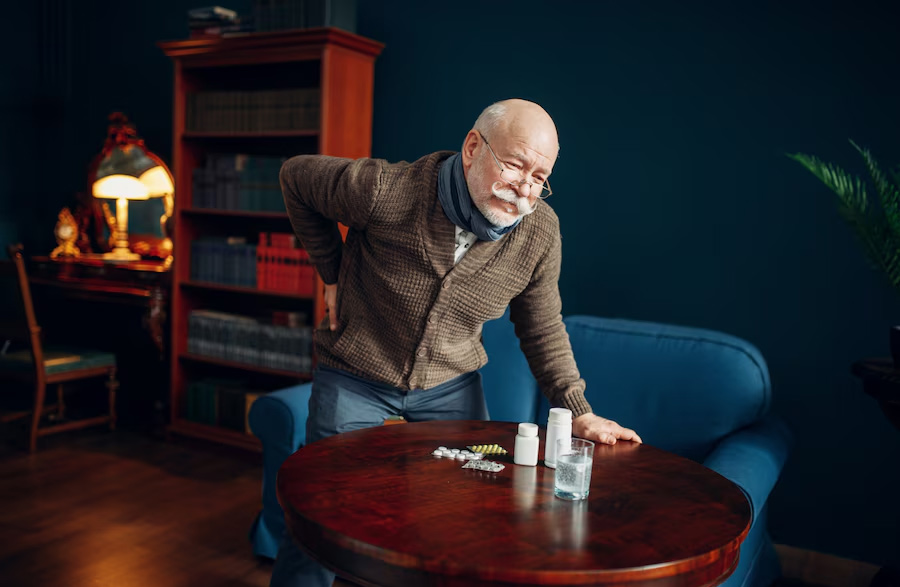
Are you waking up in the morning with stiff hips, back and neck? You might want to get yourself checked for Polymyalgia Rheumatica (PMR). PMR is a condition characterized by inflammation that leads to muscular pain and stiffness, primarily in the shoulders and hips. Symptoms of PMR typically arise suddenly and are more intense in the mornings. Morning stiffness generally lasts for at least 30 minutes or longer. Although the pain can be quite severe, it may be alleviated with activity.
Table of Content:-
RELATED: Can Your Morning Cup Of Tea Cause Bloating? Know Why You Feel Puffy After Having Chai
Who Is More Prone To Developing PMR?

The majority of individuals who develop PMR are over the age of 65, and it is rare in those under 50. Women are approximately two to three times more likely to experience this disorder. This condition is associated with another inflammatory illness known as giant cell arteritis, which can lead to headaches, vision problems, pain in the jaw, and tenderness of the scalp. It is possible to be affected by both conditions simultaneously.
What Are The Signs And Symptoms Of PMR?
The typical signs and symptoms of PMR usually manifest bilaterally and may include:
- Pain or discomfort in the shoulders
- Pain or discomfort in the neck, upper arms, buttocks, hips, or thighs
- Stiffness in the affected regions, especially in the morning or after periods of inactivity
- Reduced range of motion in the impacted areas
- Pain or stiffness in the wrists, elbows, or knees
- Additionally, you may experience more generalised signs and symptoms, such as:
- Mild fever
- Fatigue
- A general sense of unwellness (malaise)
- Loss of appetite
- Unintentional weight loss
- Depression
What Causes PMR?

The causes of PMR could include:
- Genetic factors.
- Environmental influences, such as infections.
- Ageing.
- An autoimmune response where the immune system mistakenly attacks healthy tissues.
Can PMR Cause Other Conditions?
According to a clinical review in PubMed Central, a more severe condition characterised by inflammation of the head and neck arteries, temporal arteritis, also known as giant cell arteritis, may occur in up to 20% of people with PMR. Rapid onset of new or frequent headaches (with or without scalp sensitivity or pain), jaw or tongue pain when speaking or eating, and visual anomalies including double vision or blindness in one or both eyes are all signs of temporal arteritis. Unlike PMR, temporal arteritis requires immediate medical attention. Delays in treatment might have major repercussions, such as blindness or stroke.
How Is PMR Diagnosed?
-1736943662243.jpg)
As per the Arthritis Foundation, If you are over 50 and display the following symptoms and signs, your general practitioner will likely diagnose PMR and initiate treatment promptly:
- Recent shoulder, neck, hip, or thigh pain on both sides of the body that has persisted for at least two weeks
- Muscle pain and stiffness in the shoulders, hips, or thighs in the morning lasting for a minimum of 30 minutes
- Elevated levels of inflammation indicated by blood tests
- Absence of rheumatoid arthritis symptoms like swollen joints, or negative blood tests.
RELATED: Can Eating Only Fruit In The Morning Cure Digestive Issues? Expert Answers
How Is PMR Treated?
Leading a healthy lifestyle can help mitigate the side effects of corticosteroids. Consuming a well-balanced diet and reducing salt intake can aid in preventing high blood pressure. Additionally, engaging in regular exercise can enhance the strength of your bones and muscles and help avoid weight gain.
To lower the chances of experiencing side effects during treatment, your doctor might advise taking a daily supplement of calcium and vitamin D. Supplements are frequently recommended for those using corticosteroids for over three months. Your doctor may also recommend physical therapy to help enhance your strength and expand your range of motion.
Also watch this video
How we keep this article up to date:
We work with experts and keep a close eye on the latest in health and wellness. Whenever there is a new research or helpful information, we update our articles with accurate and useful advice.
Current Version